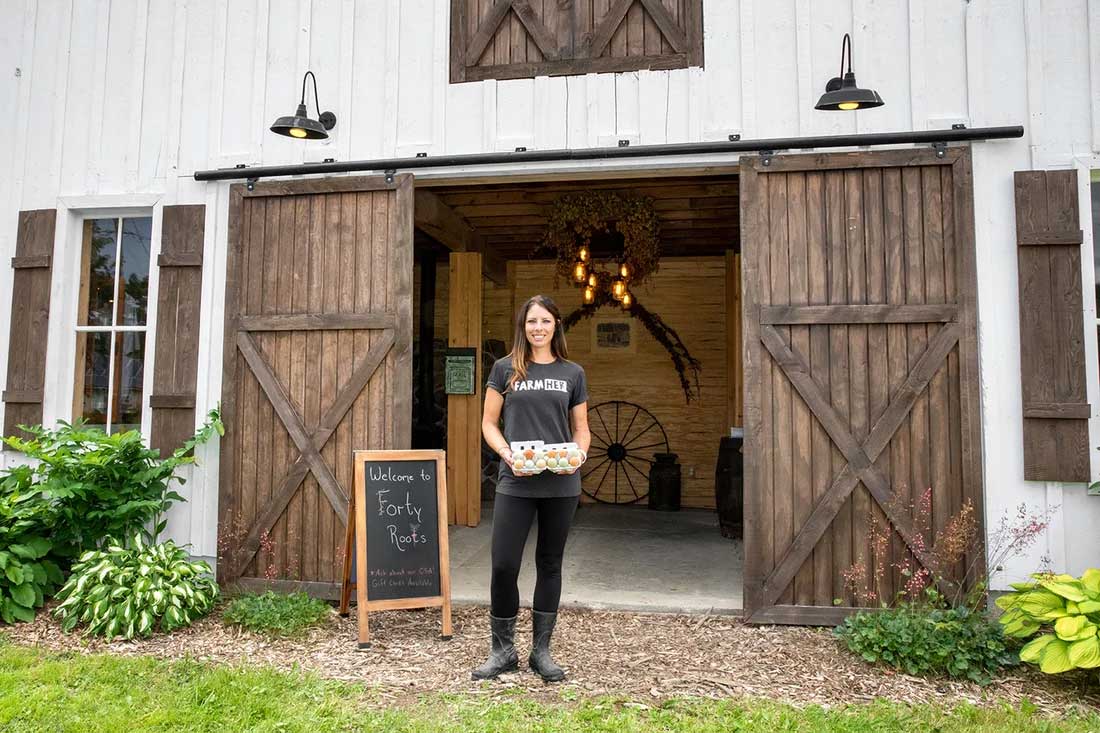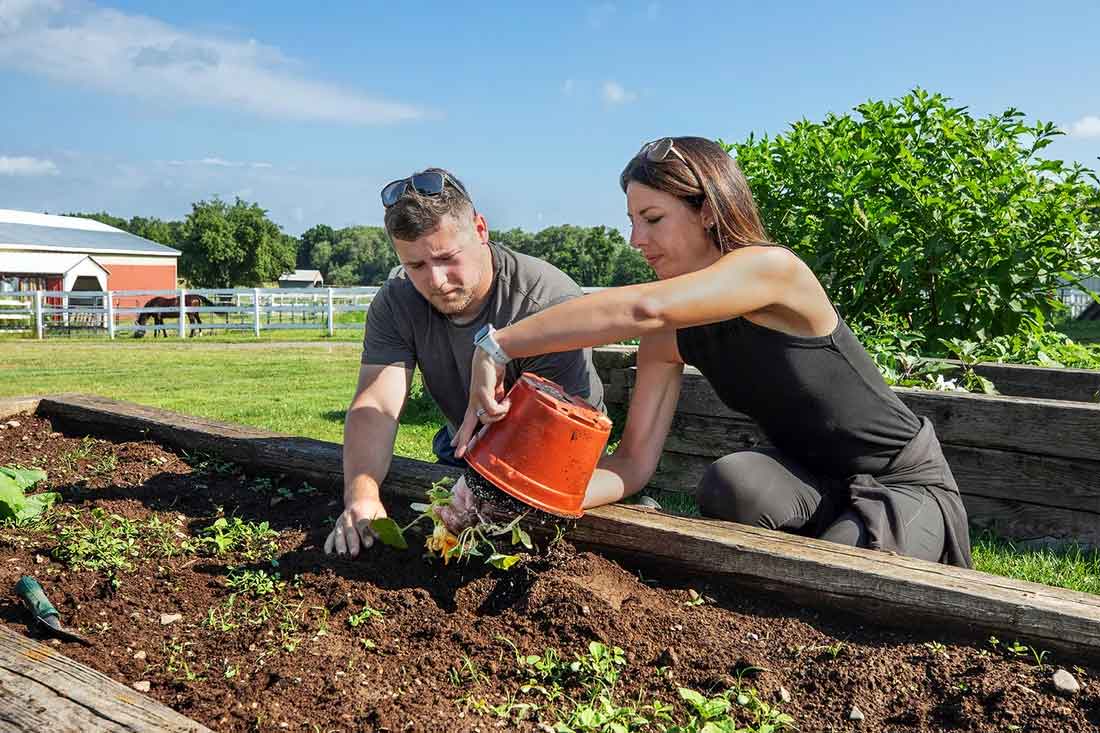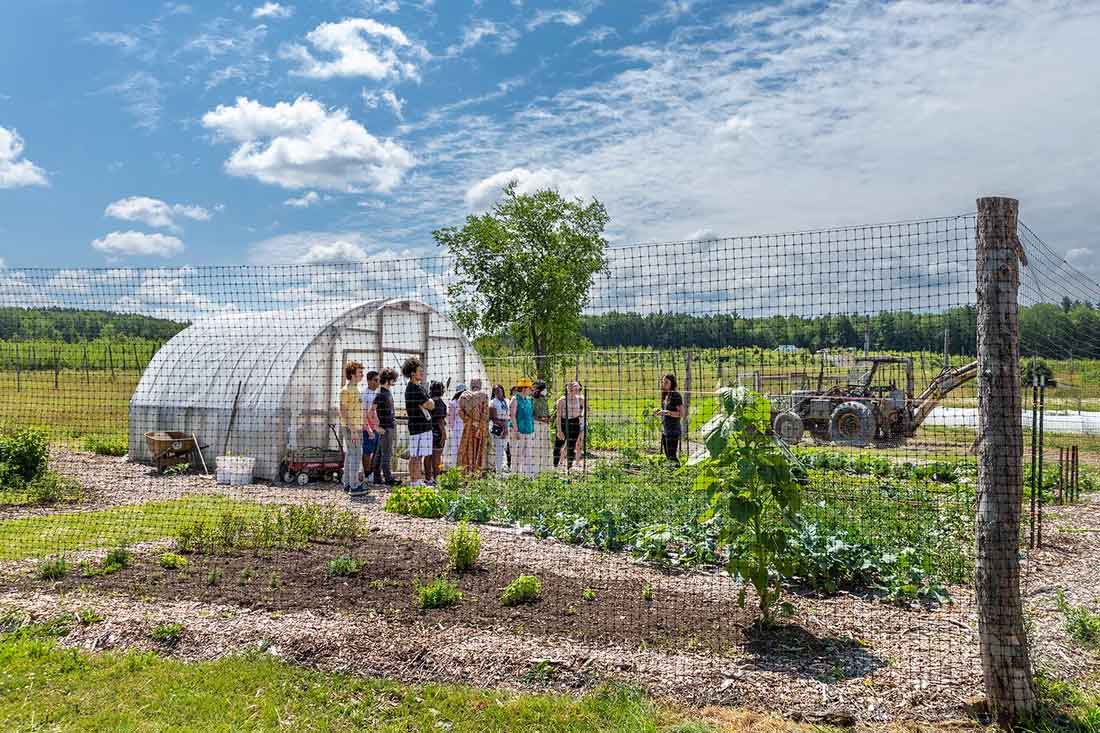About an hour north of the Syracuse University campus is a farm stand bursting with vibrant, colorful vegetables, where goats and chickens roam free and customers try their best downward dog at yoga classes in a hops field.
This is Forty Roots Farm Stand, a farm stand owned and operated by Chaya Lee Charles ’04, G’14, assistant professor of nutrition in the Department of Nutrition and Food Studies. Charles opened the farm stand in 2020 with her husband, Martin, a high school culinary arts teacher, and a friend who has a background in agricultural science.
“Getting students out of the classroom and sharing my experience at Forty Roots is crucial to getting them excited about working in the field and thinking about how they want to use their degree in the future,” says professor Charles.
The farm is a welcome counterbalance to the hustle and bustle of academic life, and it provides Charles with real-world lessons she shares with her students in the classroom. “My work on the farm has given me hands-on experience that I can share with my students. When I’m talking about food science, the nutritional quality of food, how soil health impacts that and all those things in my courses, I now have tangible experience of how that works,” Charles says.
The agricultural setting is not only perfect for growing organic vegetables, but for bringing some important lessons to her students and her community work.

Digging in the Dirt
Charles teaches nutrition education in Falk College, including courses on food science, nutrition education, weight management and disordered eating. “One of my goals as a teacher is to always bring real-life scenarios into the classroom so students can learn via hands-on experience,” Charles says.
Among the work she does in the community is with Parkinson’s disease management, an area she became interested in from working with older adults as a practicing dietitian in long-term care and assisted living facilities. She works with Empower Parkinson, an organization in Syracuse that helps people with the disease to maintain their functional abilities. “At Empower Parkinson, we provide alternative and combination therapies to help people manage their Parkinson’s disease symptoms,” Charles explains.
A group of students work with Charles and Empower Parkinson through a gardening program called Planting for Parkinson’s, a community garden that grows food that’s been linked to potential benefits for people living with Parkinson’s disease.
“At Empower Parkinson, we provide alternative and combination therapies to help people manage their Parkinson’s disease symptoms,” says Charles.”

Nutrition major Philip Farina ’23 has been working with Charles this summer in the garden. Though he began doing the work as part of a class project, he volunteered to continue with the program after the course ended and says the experience is personal as his grandmother had Parkinson’s disease.
“I’ve enjoyed working with Professor Charles this summer,” Farina says. “I’m learning about nutrition program planning, volunteer coordination, and I’ll be conducting education sessions too.” Farina plans on becoming a registered dietitian and says the planning and community education experience he’s gotten this summer are important skills he’ll be able to apply to that career.
Charles has multiple avenues for students to explore their food passions. She has led a student group in working with the Syracuse City School District, assisting their dietitian to create a fruits and vegetables campaign for the elementary schools in the district. “My main goal for students taking my classes is to leave with increased interest and curiosity on the topics we discuss, as well as an improved sense of how to apply acquired knowledge in settings within the field,” says Charles, now the advisor for the student group Slow Food, which focuses on supporting local food and traditional cooking.
Another group of students has worked with the Sustainability Management office to develop pamphlets on how to utilize the Hendricks Chapel Food Pantry and created easy-to-follow recipes using fruits and vegetables from the University’s community garden. “Those are things that could be available at the campus food pantry to help students,” Charles explains.

Nutrition for the Next Generation
Charles is also involved with another community garden on campus, Pete’s Giving Garden, which harvests produce for the food pantry. Her involvement is fueled by her passion for gardening and nutrition in general. “Nutrition is so crucial for good health—more so than people understand.”
Her passion for the field and her interest in preventative nutrition was strengthened after the birth of her son, now 9 years old. Consuming fresh, whole, unprocessed, organic foods is especially important, says Charles, to avoid disease later in life.
“As a dietitian, I try to bring the nutrition component into what we’re growing and chose foods to grow that have the best nutritional profile for our customers, and then I provide them with nutrition information on the items and healthy recipes of how to use them,” says Charles.
Charles offers community-supported agriculture (CSA) through Forty Roots and the trio is working on opening a café at the farm stand, revitalizing the hops and will soon build a greenhouse for winter gardening. The property used to be a horse farm and then a hops farm before Charles and her business partners bought it. “There’s so much time and effort that goes into organic growing, so when you get a great end product it’s pretty satisfying,” Charles says. She also brings her nutrition expertise to the CSA boxes they provide. With each weekly box customers receive, Charles includes recipes, healthy tips and instructions on how to use the vegetables.
Though one of the greatest rewards, says Charles, is when her students come back and tell her that they’ve applied the knowledge they gained through her classes and experiences in their post-grad work. “Getting students out of the classroom and sharing my experience at Forty Roots is crucial to getting them excited about working in the field and thinking about how they want to use their degree in the future.”
A Syracuse University Story by Lisa Maresca originally published on September 6, 2022.
